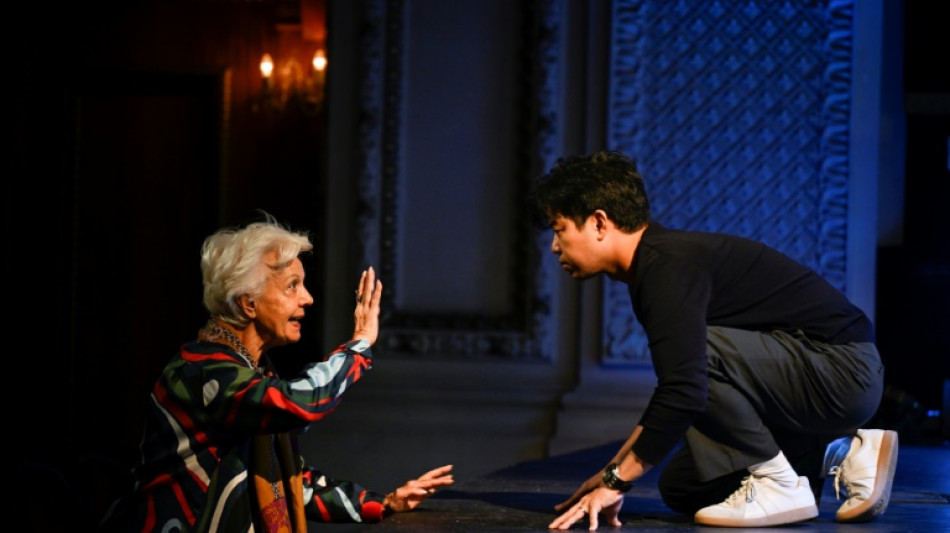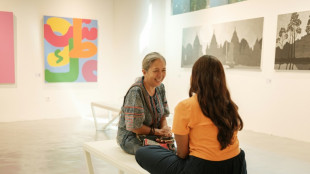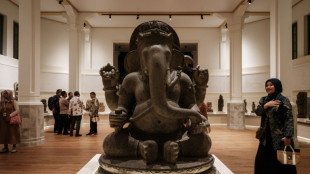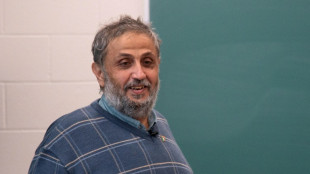
-
 Chinese ship linked to severed Baltic Sea cables sets sail
Chinese ship linked to severed Baltic Sea cables sets sail
-
Sorrow and fury in German town after Christmas market attack

-
 Guardiola vows Man City will regain confidence 'sooner or later' after another defeat
Guardiola vows Man City will regain confidence 'sooner or later' after another defeat
-
Ukraine drone hits Russian high-rise 1,000km from frontline

-
 Villa beat Man City to deepen Guardiola's pain
Villa beat Man City to deepen Guardiola's pain
-
'Perfect start' for ski great Vonn on World Cup return

-
 Germany mourns five killed, hundreds wounded in Christmas market attack
Germany mourns five killed, hundreds wounded in Christmas market attack
-
Odermatt soars to Val Gardena downhill win

-
 Mbappe's adaptation period over: Real Madrid's Ancelotti
Mbappe's adaptation period over: Real Madrid's Ancelotti
-
France's most powerful nuclear reactor finally comes on stream

-
 Ski great Vonn finishes 14th on World Cup return
Ski great Vonn finishes 14th on World Cup return
-
Scholz visits site of deadly Christmas market attack

-
 Heavyweight foes Usyk, Fury set for titanic rematch
Heavyweight foes Usyk, Fury set for titanic rematch
-
Drone attack hits Russian city 1,000km from Ukraine frontier

-
 Former England winger Eastham dies aged 88
Former England winger Eastham dies aged 88
-
Pakistan Taliban claim raid killing 16 soldiers

-
 Pakistan military courts convict 25 of pro-Khan unrest
Pakistan military courts convict 25 of pro-Khan unrest
-
US Congress passes bill to avert shutdown

-
 Sierra Leone student tackles toxic air pollution
Sierra Leone student tackles toxic air pollution
-
German leader to visit site of deadly Christmas market attack

-
 16 injured after Israel hit by Yemen-launched 'projectile'
16 injured after Israel hit by Yemen-launched 'projectile'
-
Google counters bid by US to force sale of Chrome

-
 Russia says Kursk strike kills 5 after Moscow claims deadly Kyiv attack
Russia says Kursk strike kills 5 after Moscow claims deadly Kyiv attack
-
Cavaliers cruise past Bucks, Embiid shines in Sixers win

-
 US President Biden authorizes $571 million in military aid to Taiwan
US President Biden authorizes $571 million in military aid to Taiwan
-
Arahmaiani: the Indonesian artist with a thousand lives

-
 Indonesians embrace return of plundered treasure from the Dutch
Indonesians embrace return of plundered treasure from the Dutch
-
Qualcomm scores key win in licensing dispute with Arm

-
 Scientists observe 'negative time' in quantum experiments
Scientists observe 'negative time' in quantum experiments
-
US approves first drug treatment for sleep apnea

-
 US drops bounty for Syria's new leader after Damascus meeting
US drops bounty for Syria's new leader after Damascus meeting
-
Saudi man arrested after deadly car attack on German Christmas market

-
 'Torn from my side': horror of German Christmas market attack
'Torn from my side': horror of German Christmas market attack
-
Bayern Munich rout Leipzig on sombre night in Germany

-
 Tiger in family golf event but has 'long way' before PGA return
Tiger in family golf event but has 'long way' before PGA return
-
Pogba wants to 'turn page' after brother sentenced in extortion case

-
 Court rules against El Salvador in controversial abortion case
Court rules against El Salvador in controversial abortion case
-
French court hands down heavy sentences in teacher beheading trial

-
 Israel army says troops shot Syrian protester in leg
Israel army says troops shot Syrian protester in leg
-
Tien sets-up all-American NextGen semi-final duel

-
 Bulked-up Fury promises 'war' in Usyk rematch
Bulked-up Fury promises 'war' in Usyk rematch
-
Major reshuffle as Trudeau faces party pressure, Trump taunts

-
 Reggaeton star Daddy Yankee in court, says wife embezzled $100 mn
Reggaeton star Daddy Yankee in court, says wife embezzled $100 mn
-
Injured Eze out of Palace's clash with Arsenal

-
 Norway's Deila named coach of MLS Atlanta United
Norway's Deila named coach of MLS Atlanta United
-
Inter-American Court rules Colombia drilling violated native rights

-
 Amazon expects no disruptions as US strike goes into 2nd day
Amazon expects no disruptions as US strike goes into 2nd day
-
Man Utd 'more in control' under Amorim says Iraola

-
 Emery insists Guardiola 'still the best' despite Man City slump
Emery insists Guardiola 'still the best' despite Man City slump
-
US confirms billions in chips funds to Samsung, Texas Instruments


Nearly 90, but opera legend Kabaivanska is still calling tune
Raina Kabaivanska was one of the greatest sopranos of her generation -- arguably the greatest Tosca after Maria Callas. And even at 89, the Bulgarian singer is still a force in opera.
She may have given her last stage performance a decade ago, but her influence continues through the young stars she mentors through her annual masterclass in Sofia.
"When my career ended, I had this inner necessity to continue to be in the music," Kabaivanska -- who turns 90 in December -- told AFP.
"My life is music. Music gives you energy and inspiration and, above all, forms you as a person."
As her students took turns rehearsing their arias for this year's final gala concert in Sofia, Kabaivanska lip synched and gestured along in the shadows of the darkened hall.
Then suddenly, she left her seat, her arms delicately dancing to guide the singer through the most difficult parts.
"I am very old and absolutely I don't hide this. But this gives me great power to work with the young," Kabaivanska laughed.
"I have this ambition -- to set them on the right path."
- Pavarotti duos -
Born in 1934 in the Black Sea city of Burgas, Kabaivanska learned piano as a child. Then a teacher at her high school in Sofia noticed her voice and included her in the choir.
She made her debut at the Sofia Opera in 1957 and two years later moved to Italy, where she performed at Milan's famous La Scala opera house, quickly making a name for herself.
She went on to bedazzle audiences around the world making roles such as Tosca and Madame Butterfly her own and sharing the stage with Spain's Placido Domingo and Italy's Luciano Pavarotti, a close friend and collaborator.
His family asked her to open the great tenor's funeral mass in 2007 in Modena, with Kabaivanska giving a particularly moving rendition of Verdi's "Ave Maria".
Strikingly beautiful, Kabaivanska was also a talented actor.
George Tekev was spellbound when as a nine-year-old he watched her play Queen Elisabeth in Verdi's "Don Carlos" half a century ago.
Twenty-five years later the academic invited her to give a masterclass at the New Bulgarian University (NBU).
"First and foremost, she is very inspiring, and she is a heavyweight. Maintaining such high standards requires a lot of effort," said the NBU's executive director of their long collaboration.
- 'Born to sing' -
More than 200 students from all over the world have passed through the masterclasses Kabaivanska has taught every autumn since 2001 in Sofia.
Nearly half have continued to study with her at different schools in Italy with scholarships from a fund bearing her name.
Among those that have passed through "Kabaivanska school" are sopranos Maria Agresta from Italy, South Korean Vittoria Yeo and Ukrainian Sofia Soloviy, Italian tenor Andrea Care and South Korean baritone Simon Lim.
This year more than 90 singers turned up at the auditions for just 14 places.
"What is required is talent. Talent says it all," said Kabaivanska.
"Talent is not just natural abilities but also a capability to see the world in a different way. You are simply born to sing."
Even for the most talented, it is not easy to make a living "because art no longer holds the importance with the public that it had years ago," she said.
For student Baia Saganelidze, a 30-year-old mezzo-soprano from Georgia, the opera star "is teaching us everything -- how to sing, how to live, how to bring a certain role to the public."
"We always think about characters, the composer, every detail is discussed with her," Saganelidze told AFP.
Another student, Romanian bass Andrei Miclea, 25, said it was a "great honour" to be in the class.
"We learn from the maestra but we also learn from each other. We have a saying in this job -- 'You have to steal from everybody.'"
C.Amaral--PC



